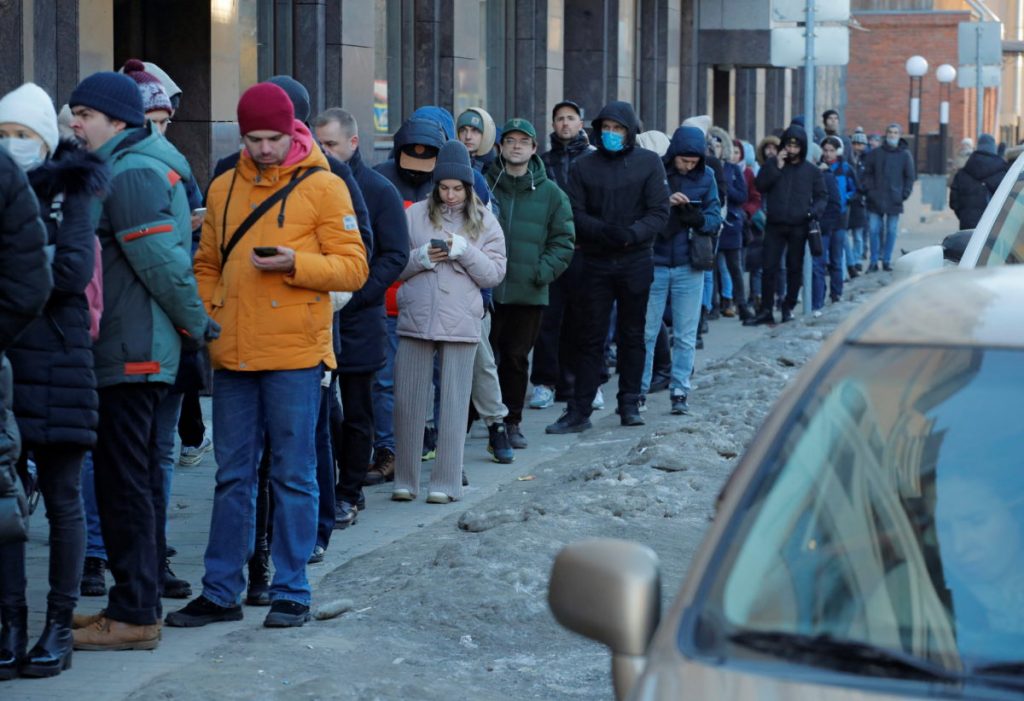Russian President Vladimir Putin has invaded Ukraine, causing fear, panic, death, and destruction. As troops edge closer to the capital, the significantly weaker Ukrainian military is fighting back and losing.
The United States and its NATO allies have unveiled a set of increasingly broad economic sanctions on Russia. Biden said these sanctions will “impose severe costs on the Russian economy, both immediately and over time.” For a while, these were known as “the mother of all sanctions”, meant to deeply destabilize the Russian economy.
These new sanctions on Russia include blocks on technological exports to Russia, such as semiconductor chips and other materials necessary for the defense and aerospace industries. Biden also applied sanctions directly to Russia’s major banks, Sberbank and VTB, as well as elites tied to the Kremlin, freezing every asset Russia has in the United States. “That means we’ve cut off Russia’s government from Western financing. It can no longer raise money from the West and can not trade in its new debt on our markets or European markets either,” he said.
The Russian economy has already taken a hit, with the country’s stocks and currency, the ruble, tanking this week. The Biden administration, along with European allies, have also cut off some Russian banks from the SWIFT financial system, the Belgian payment network that underpins the global economy, which could have devastating impacts on the Russian economy.
Many advocate for sanctions as a way to hold governments accountable — including “progressives” like AOC — believing in the illusion that they are a “nonviolent” alternative to military intervention.
But these are fallacies; sanctions are a devastating extension of war.
While imperialist leaders claim that targeted sanctions are a lesser evil, we must wholeheartedly oppose these tools of imperialism that overwhelmingly harm the working class and fan the flames of war.
Sanctions Hurt the Working Masses, Not the Capitalists
In the age of imperialism and the domination of finance capital, power is not only wielded by military might, but also through economic influence. Even as imperialist Woodrow Wilson admitted in 1919, “A nation that is boycotted is a nation that is in sight of surrender. Apply this economic, peaceful, silent, deadly remedy and there will be no need for force.” Wilson’s self-contradictory description exposes the myth of sanctions as a lesser evil. Boycotts may be presented as “peaceful” but the end result is always “deadly.”
Sanctions are a tool of economic warfare by which governments attempt to impose their will without putting troops on the ground. Even when sanctions are only placed on specific members of a country’s government, corporations tend to completely avoid doing business with countries where U.S. sanctions are in place. This results in entire populations of sanctioned countries being economically cut off from international trade — and in moments of crisis, it’s always the working class and poor who have to pay.
Imperialist leaders claim that sanctions are “targeted” but in reality, the masses are the ones that pay the price.
The Governance and Social Development Resource Centre published a review in 2017 with important takeaways about sanctions. The review concludes that economic sanctions increase wealth disparities and further impoverish working-class and poor people, and that women and marginalized groups in sanctioned countries feel greater effects compared to the rest of the population. Importantly, the GSDRC also found that wealthy elites “manage to negotiate the adverse effects to a far greater level than poorer citizens.” In other words, the groups that sanctions are supposed to target are those most capable of evading their impacts, while the most vulnerable shoulder their burden.
Ordinary Russians, the majority of whom do not want war in the first place, are now facing the consequences of a rapidly buckling economy which was suffering even before the invasion. The devaluation of the ruble caused crowds of Russians to withdraw cash from ATMs. On Monday, the Russian central bank increased the interest rate from 9.5 to 20 percent to deter people from taking out more cash. Russia has been blocked from most electronic payment systems, such as Google and Apple Pay, creating long lines in many public places frequented by the working class. As the economic situation plummets, the social upheaval because of these sanctions is also beginning to take shape.
U.S. Sanctions Today
For more than half a century, the United States has used this tool of economic warfare to further U.S. corporate interests. For example, the trade embargo on Cuba, which began in 1960, is still in place, forbidding most U.S. companies from doing business with Cuba. These sanctions even punish foreign companies that engage in trade with Cuba. The United Nations estimates that over 60 years, the embargo has cost the Cuban economy $130 billion dollars, resulting in food, fuel, and medicine shortages.
Over the past two decades, sanctions have proliferated as a method of getting what the United States wants. The Treasury Department reports that the use of sanctions as a national security tool had grown by 933 percent from 2000 to 2021. There were 912 sanction designations in place at the turn of the century, compared to more than 9,400 last year.
In 1990, the United States imposed sanctions against Iraq after the invasion of Kuwait, which in just a year’s time had devastating consequences on the Iraqi population. By 1991, Iraq had soaring rates of malnutrition, insufficient medical supplies, and an outbreak of diseases due to the lack of clean water. In the same year, the Organization of American States (OAS), an arm of U.S. imperialism in the Americas, imposed a deadly three-year trade, arms, and oil embargo on Haiti following the coup-d’état of then-president Aristide, which had grave consequences for Haitian people. 140,000 private-sector jobs were lost. Deforestation was accelerated to compensate for the lack of fuel imports. Electricity shortages devastated public health, as vaccines and medications could not be properly preserved with refrigeration.
In recent years, targeted sanctions, or “smart sanctions,” have come to dominate the official discourse. Governments claim that these targeted sanctions single out a country’s elites rather than the entire population. But just as there are no smart bombs, there are no smart sanctions. After the U.S. withdrawal from Afghanistan last year, sanctions were placed on the Taliban, leading to an ongoing humanitarian crisis. It is estimated that 98 percent of the people in Afghanistan are not getting enough to eat.
In the case of economic sanctions being enacted against Russia, it’s clear the working class in the United States will also suffer as a result. Biden has made no secret of this, saying “defending freedom will have costs.” Gas prices have already been skyrocketing and inflation is the highest it’s been in forty years. The sanctions on Russia are sure to hurt working class people in the U.S. who drive long distances to get to work or school and are already struggling economically.
Sanctions Are a Tool for Imperialist Interests, Not Humanitarian Ones
Despite cynical claims by imperialists that sanctions are for “humanitarian” interests, their true purpose is for capitalist interests — as is all of U.S. foreign policy.
We must get this fact straight from the start: the United States is not a force for democracy or humanitarianism around the world. Take a look at Palestine, where the Unites States funds Zionist forces that commit murder and uphold apartheid. Take a look at Venezuela, where sanctions are literally starving people while the United States refuses to acknowledge the democratically elected President.
Obama posted this statement last week making appeals to “democracy, rule of law, equality, individual liberty, freedom of expression and worship, and self-determination.” Don’t be fooled by these lofty appeals — Obama dropped bombs during his administration on more countries than George W. Bush.
Last week, Germany halted approval of the Nord Stream 2 pipeline, which would have transported natural gas from Russia to the rest of Europe through Germany. Kenneth C. Griffin and Niall Ferguson write in the Wall Street Journal, “The American capacity to export liquefied natural gas is growing every year. … The U.S. should frack more, so it has the gas needed to wean Europe off Russian pipelines.” As Russian masses scramble to protect what savings they may have, U.S. companies stand to make huge profits from liquified natural gas if Russian oil is cut off from Europe. Imperialism always serves to protect capitalist interests.
The current U.S. sanctions on Russia are not about defending the Ukrainian people; they’re about blocking the expansion of the Russian sphere of influence, expanding domestic business interests, and attempting to reassert waning U.S. hegemony.
Against Russia, NATO and U.S. Imperialism
On the eve of World War II, Trotsky summarized Lenin’s conclusions on imperialism from his observations of World War I: “Imperialism seeks to divide and redivide the world. In place of national wars there come imperialist wars. They are utterly reactionary in character and are an expression of the impasse, stagnation, and decay of monopoly capital.”
Lenin characterized the imperialist epoch as one of “crisis, wars and revolutions”— and although we have not seen revolutions recently, we have certainly seen crisis on a huge scale: the 2008 economic crisis and the current coronavirus crisis. And in this context, the United States is a declining imperialist power, desperate to hold on to world hegemony against the rising economic and technological power of China.
This is the backdrop for the current crisis in Ukraine, in which reactionary and imperialist forces are meeting head to head in the face of increasing geopolitical contradictions. There are only reactionary camps at play; Putin’s authoritarian regime and invasion of Ukraine are bringing death and destruction to Ukraine and economic crisis to the Russian working class. He is repressing protesters who speak out and stifling dissent.
NATO and the United States are also reactionary— seeking to make Ukraine a semi-colony under their influence and imposing brutal sanctions, as we have explored in this article.
As stated in our Declaration:
Only through a policy of independence will it be possible to confront imperialism, Putin’s reactionary policies, and the reactionary nationalisms that divide Ukraine — whether the neo-Nazi pro-Western nationalist organizations that support the Ukrainian government or the pro-Russian nationalists. … Only this way out, led by the working class, down a path of a working-class and socialist Ukraine, can guarantee the respect of all democratic and national rights, as well as an end to systematic plunder at the hands of foreign companies and the local oligarchies.
As the working class, we must wholeheartedly oppose the sanctions imposed by our imperialist governments that only serve to protect their own interests. An attack on the working class anywhere — whether Russia or Ukraine — is an attack on us all.












